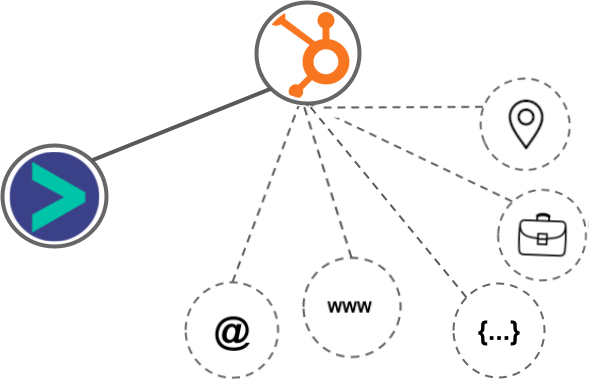HubSpot CRM vs Pardot
Hyperise integrates with 100's of sales and marketing tools, many of which are in the CRM category. With so many to choose from it's sometimes hard to know which is best, but don't worry, we've got your covered.
In this comparison guide we're going to look at the Highlights, Pros, Cons and Pricing of HubSpot CRM and Pardot. We'll also delve into the details of which offers the best personalization options within CRM, with there respective Hyperise integrations

HubSpot CRM
Pricing: Hubspot offers a range of pricing plans, including a free version and paid plans starting at $50 per month. The exact price depends on the features and the number of contacts you need to manage.
Vs
Pardot
Pricing: Pardot Standard: Starting at $1,250 per year for up to 10,000 contacts, this tier includes email marketing, lead management, and reporting. Pardot Pro: Starting at $2,500 per year for up to 10,000 contacts, this tier includes all Standard features, as well as advanced lead nurturing, dynamic content, and landing pages. Pardot Ultimate: Starting at $4,000 per year for up to 10,000 contacts, this tier includes all Pro features, as well as revenue cycle analytics and predictive intelligence.
HubSpot CRM vs Pardot Highlights
Hubspot and Pardot are both marketing automation platforms that offer a wide range of tools and features to help businesses improve their marketing efforts. However, there are some key differences between the two.
Target Market: Hubspot is marketed towards small to mid-sized businesses, whereas Pardot is specifically designed for B2B organizations.
Features: Hubspot offers a wider range of features, including customer relationship management (CRM), sales, and service. Pardot, on the other hand, is more focused on marketing automation, including lead nurturing, email marketing, and reporting.
Integration: Hubspot has a more extensive integration library, offering integration with a wider range of third-party tools and services. Pardot, being a part of the Salesforce suite of products, has a tight integration with Salesforce and is often used by organizations that already use the CRM platform.
Pricing: Hubspot has a freemium model, offering a range of features for free, with paid plans starting at $50 per month. Pardot's pricing starts at $1,250 per year and increases based on the number of contacts and features required.
HubSpot CRM vs Pardot Pros
HubSpot CRM Pros
- HubSpot offers a wider range of features, including customer relationship management (CRM), sales, and service.
- HubSpot has a freemium model, offering a range of features for free, with paid plans starting at $50 per month.
- HubSpot is marketed towards small to mid-sized businesses, making it a good fit for organizations with limited resources.
- HubSpot has a more extensive integration library, offering integration with a wider range of third-party tools and services.
- HubSpot has a simple and intuitive interface, making it easy for users to get started.
Pardot Pros
- Pardot is specifically designed for B2B organizations, making it a better fit for organizations focused on lead nurturing and email marketing.
- Pardot is part of the Salesforce suite of products, making it easier for organizations that already use Salesforce to manage their sales and marketing efforts.
- Pardot provides more advanced reporting and analytics capabilities compared to HubSpot.
- Pardot has a stronger focus on marketing automation, including lead nurturing, email marketing, and reporting.
- Pardot's tight integration with Salesforce makes it easier for organizations to manage their sales and marketing data from a single platform.
HubSpot CRM vs Pardot Cons
HubSpot CRM Cons
- HubSpot can be more expensive compared to Pardot, especially for organizations with a large number of contacts or requiring advanced features.
- HubSpot's focus on a wide range of features means that some features may not be as advanced as those offered by more specialized platforms, such as Pardot.
- HubSpot may have a steeper learning curve compared to Pardot, as it offers a wider range of features and tools.
Pardot Cons
- Pardot is designed specifically for B2B organizations, making it less suitable for organizations focused on other types of marketing.
- Pardot is part of the Salesforce suite of products, making it a better fit for organizations that already use Salesforce. For organizations that don't use Salesforce, Pardot may be less convenient to use.
- Pardot's focus on B2B organizations means that some features, such as social media management, may not be as advanced as those offered by more general-purpose platforms like HubSpot.
- Pardot can be more complex to use compared to HubSpot, with a steeper learning curve for new users.
HubSpot CRM & Pardot Hyperise Integrations
HubSpot CRM uses the HTML code embed method to integrate with Hyperise, giving a simple way to add personalized images to your messages.
HubSpot CRM makes the following data points available to Hyperise, to enable personalization in images used in outreach and linked out to your personalized website landing pages.

- Using business Email passed from HubSpot CRM, Hyperise is able to enrich business logo and website screenshots. In some cases, with a business Email we're also able to enrich profile images, subject to the business email having a publicly available profile.
- Using business Website passed from HubSpot CRM, Hyperise is able to enrich business logo and website screenshots.
- Business name
- Job title
- City
- Country
HubSpot CRM Integration Guide
Pardot uses the HTML code embed method to integrate with Hyperise, giving a simple way to add personalized images to your messages.
Pardot makes the following data points available to Hyperise, to enable personalization in images used in outreach and linked out to your personalized website landing pages.
- Using business Email passed from Pardot, Hyperise is able to enrich business logo and website screenshots. In some cases, with a business Email we're also able to enrich profile images, subject to the business email having a publicly available profile.
- Using business Website passed from Pardot, Hyperise is able to enrich business logo and website screenshots.
- Business name
- City
- State
- Country
- Zip
- Category
Pardot Integration Guide
 vs
vs 

 vs
vs  vs
vs 


 vs
vs  vs
vs  vs
vs  vs
vs  vs
vs  vs
vs  vs
vs  vs
vs  vs
vs 







